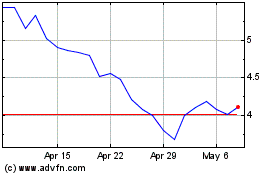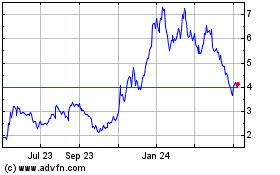Autolus Therapeutics to Present Three Clinical Data Updates at the American Society of Hematology (ASH) Annual Meeting 2022
November 03 2022 - 9:31AM

Autolus Therapeutics plc (Nasdaq: AUTL), a clinical-stage
biopharmaceutical company developing next-generation programmed T
cell therapies, today announces the online publication of three
abstracts submitted to the American Society of Hematology (ASH)
Annual Meeting, to be held December 10-13, 2022.
“We’re looking forward to presenting follow up
data from three of our clinical trials at ASH this year. Obe-cel
continues to show a potentially best-in-class profile across a
number of indications, and we will be presenting the encouraging
safety, efficacy and long-term follow up of obe-cel in
relapsed/refractory B-ALL as well as in the B-NHL cohorts from the
ALLCAR19 study,” said Dr. Christian Itin, Chief Executive
Officer of Autolus. “For both AUTO1/22 in pediatric ALL
patients and for AUTO4 in peripheral T Cell Lymphoma we will
present longer follow up data.”
Abstracts to be presented:
- Title: Safety, Efficiency
and Long-Term Follow-up of AUTO1, a Fast-Off Rate CD19 CAR in
Relapsed/Refractory B-Cell Acute Lymphoblastic Leukaemia and Other
B-Cell MalignanciesLINK to
abstractSession Title: 704. Cellular
Immunotherapies: Early Phase and Investigational Therapies: Poster
II Session date and time: Sunday, December 11,
2022, 6:00 PM – 8:00 PMSession room: Ernest N.
Morial Convention Center, Hall DPublication
Number: 3318Presenting Author: Dr. Claire
Roddie, MD, PhD, FRCPath, Consultant Haematologist and
Honorary Senior Lecturer, Cancer Institute, University College
London (UCL)Summary: obe-cel (AUTO1) has
demonstrated an excellent safety profile across 3 reported trials,
with low levels of CRS/ICANS. Overall, obe-cel has a tolerable
safety profile in patients with r/r B-cell cancers despite high
disease burden. In the B-ALL cohort of the ALLCAR19 study,
long-term follow-up indicates that a subset of patients continue in
remission post- obe-cel without need for further anti-leukemia
therapy. In both indolent and aggressive NHL and in CLL, obe-cel
shows excellent ORR and CAR engraftment/persistence. Additional
patients, updated data and longer follow up will be presented.
- Title:
Dual Antigen Targeting with Co-Transduced CD19/22 CAR T
Cells May Prevent Antigen-Negative Relapse after CAR T Cell Therapy
for Relapsed/Refractory ALL (AUTO1/22)LINK to
abstractSession Title: 704. Cellular
Immunotherapies: Early Phase and Investigational Therapies: Poster
IIISession date and time: Monday, December 12,
2022, 6:00 PM – 8:00 PMSession room: Ernest N.
Morial Convention Center, Hall DPublication
Number: 4650Presenting Author: Dr. Sara
Ghorashian, MD, PhD, Hon clinical senior lecturer, UCL Great Ormond
Street Institute of Child HealthSummary: CD19
negative escape is a major cause of relapse after CD19 CAR T cell
therapy for relapsed/refractory (r/r) pediatric ALL. To overcome
this challenge, AUTO1/22 builds on the favorable safety profile and
excellent persistence of obe-cel by combining it with an additional
CD22 targeting CAR. As of 21 July 2022, 12 pediatric ALL patients
have been treated with AUTO1/22. Overall, at a median follow-up of
8.7 months (range 1-15 months), 6/10 responding patients remain in
MRD negative CR at last follow-up. Importantly, antigen-negative
relapse has not been observed.
- Title: First in Human Study
of AUTO4, a TRBC1-Targeting CAR T-Cell Therapy in
Relapsed/Refractory TRBC1-Positive Peripheral T-Cell
LymphomaLINK to abstractSession
Title: 704. Cellular Immunotherapies: Early Phase and
Investigational Therapies: Poster IIISession date and
time: Monday, December 12, 2022, 6:00 PM – 8:00
PMSession room: Ernest N. Morial Convention
Center, Hall DPublication Number:
4634Presenting Author: Dr Kate Cwynarski,
Consultant Haematologist University College London Hospitals
(UCLH)Summary: Peripheral T cell lymphomas (PTCL)
are typically aggressive, treatment resistant, and associated with
poor prognosis. Finding the right target is challenging because
there is a lack of tumor-specific antigens, and pan-T cell
depletion leads to immunosuppression. T cell lymphoma is clonal,
and tumor cells express either TRBC1 or TRBC2. AUTO4 targets TRBC1+
cells, which allows part of the T cell compartment to be retained.
This study is ongoing, with additional patients due to be treated
to define the recommended phase 2 dose using the new manufacturing
process.
About Autolus Therapeutics
plcAutolus is a clinical-stage biopharmaceutical company
developing next-generation, programmed T cell therapies for the
treatment of cancer. Using a broad suite of proprietary and modular
T cell programming technologies, the Company is engineering
precisely targeted, controlled and highly active T cell therapies
that are designed to better recognize cancer cells, break down
their defense mechanisms and eliminate these cells. Autolus has a
pipeline of product candidates in development for the treatment of
hematological malignancies and solid tumors. For more information,
please visit www.autolus.com.
About
obe-cel (AUTO1)Obe-cel is a CD19 CAR T cell
investigational therapy designed to overcome the limitations in
clinical activity and safety compared to current CD19 CAR T cell
therapies. Designed to have a fast target binding off-rate to
minimize excessive activation of the programmed T cells, obe-cel
may reduce toxicity and be less prone to T cell exhaustion, which
could enhance persistence and improve the ability of the programmed
T cells to engage in serial killing of target cancer cells. In
collaboration with Autolus’ academic partner, UCL, obe-cel is
currently being evaluated in a Phase 1 clinical trials for B-NHL.
Autolus has progressed obe-cel to the FELIX trial, a potential
pivotal trial for adult ALL.
About AUTO1/22AUTO1/22 is a
novel dual targeting CAR T cell-based therapy candidate based on
obe-cel. It is designed to combine the enhanced safety, robust
expansion & persistence seen with the fast off rate CD19 CAR
from obe-cel with a high sensitivity CD22 CAR to reduce antigen
negative relapses. This product candidate is currently in a Phase 1
clinical trial called CARPALL for patients with r/r pediatric ALL.
[NCT02443831]
About AUTO4AUTO4 is a
programmed T cell product candidate in clinical development for T
cell lymphoma, a setting where there are currently no approved
programmed T cell therapies. AUTO4 is specifically designed to
target TRBC1 derived cancers, which account for approximately 40%
of T cell lymphomas, and is a complement to the AUTO5 T cell
product candidate, which is in pre-clinical development. AUTO4 has
been tested in a Phase 1 clinical trial, LibRA1 for patients with
peripheral T cell Lymphoma.
Forward-Looking StatementsThis
press release contains forward-looking statements within the
meaning of the "safe harbor" provisions of the Private Securities
Litigation Reform Act of 1995. Forward-looking statements are
statements that are not historical facts, and in some cases can be
identified by terms such as "may," "will," "could," "expects,"
"plans," "anticipates," and "believes." These statements include,
but are not limited to, statements regarding Autolus’ development
of the obe-cel program; the future clinical development, efficacy,
safety and therapeutic potential of its product candidates,
including progress, expectations as to the reporting of data,
conduct and timing and potential future clinical activity and
milestones; expectations regarding the initiation, design and
reporting of data from clinical trials; expectations regarding
regulatory approval process for any product candidates; the
collaboration between Autolus and Blackstone; the discovery,
development and potential commercialization of potential product
candidates including obe-cel using Autolus’ technology and under
the collaboration agreement; the therapeutic potential for Autolus
in next generation product developments of obe-cel in B-cell
malignancies; the potential and timing to receive milestone
payments and pay royalties under the strategic collaboration; and
the Company’s anticipated cash runway. Any forward-looking
statements are based on management's current views and assumptions
and involve risks and uncertainties that could cause actual
results, performance, or events to differ materially from those
expressed or implied in such statements. These risks and
uncertainties include, but are not limited to, the risks that
Autolus’ preclinical or clinical programs do not advance or result
in approved products on a timely or cost effective basis or at all;
the results of early clinical trials are not always being
predictive of future results; the cost, timing and results of
clinical trials; that many product candidates do not become
approved drugs on a timely or cost effective basis or at all; the
ability to enroll patients in clinical trials; possible safety and
efficacy concerns; and the impact of the ongoing COVID-19 pandemic
on Autolus’ business. For a discussion of other risks and
uncertainties, and other important factors, any of which could
cause Autolus’ actual results to differ from those contained in the
forward-looking statements, see the section titled "Risk Factors"
in Autolus' Annual Report on Form 20-F filed with the Securities
and Exchange Commission on March 10, 2022, as well as discussions
of potential risks, uncertainties, and other important factors in
Autolus' subsequent filings with the Securities and Exchange
Commission. All information in this press release is as of the date
of the release, and Autolus undertakes no obligation to publicly
update any forward-looking statement, whether as a result of new
information, future events, or otherwise, except as required by
law.
Contact:
Olivia Manser+44 (0) 7780
471568o.manser@autolus.com
Julia Wilson+44 (0) 7818
430877j.wilson@autolus.com
Susan A. NoonanS.A. Noonan
Communications+1-917-513-5303susan@sanoonan.com
Autolus Therapeutics (NASDAQ:AUTL)
Historical Stock Chart
From Mar 2024 to Apr 2024

Autolus Therapeutics (NASDAQ:AUTL)
Historical Stock Chart
From Apr 2023 to Apr 2024
